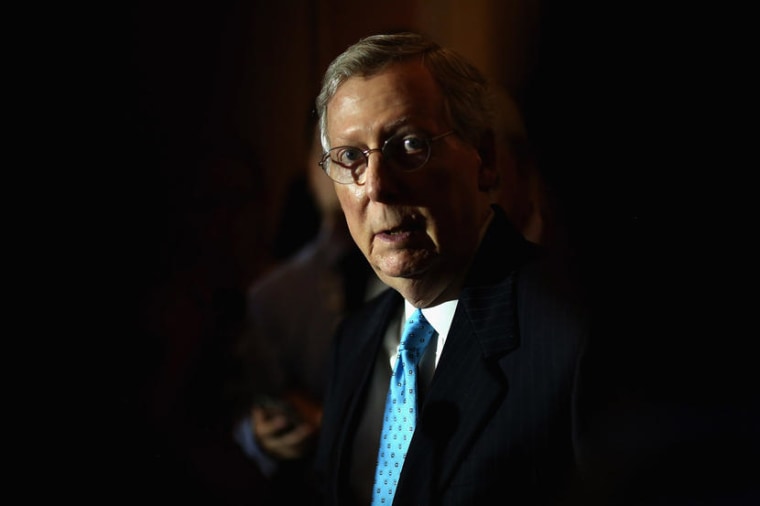When then-President Obama took executive action to deal with immigration policy in late 2014, Senate Majority Leader Mitch McConnell (R-Ky.) condemned the move as an undemocratic power-grab.
"Imposing his will unilaterally may seem tempting," the GOP leader said at the time. "It may serve him politically in the short term. But he knows it will make an already broken system even more broken.... And he knows this is not how democracy works."
Nearly six years later, as Donald Trump takes new steps to circumvent Congress, McConnell seems far less interested in how democracy works.
"Struggling Americans need action now.... I support President Trump exploring his options to get unemployment benefits and other relief to the people who need them the most.... I am glad that President Trump is proving that while Democrats use laid-off workers as political pawns, Republicans will actually look out for them."
Sen. Chuck Grassley's (R-Iowa) writing style on Twitter is often difficult to decipher, but he made clear on Saturday that he also "applauds" the Republican president taking executive actions on economic aid.
It's worth emphasizing that Grassley is the chairman of the Senate Finance Committee -- and under normal political circumstances, the chairman of the Senate Finance Committee would not look kindly at a White House trying to write its own tax-and-spending policies without Congress. But if Trump wants to bypass Capitol Hill, the partisan Iowan is content to celebrate.
It would be an overstatement to say these GOP attitudes were universal -- Sen. Ben Sasse (R-Neb.), for example, referred to Trump's moves as "unconstitutional slop" -- but for the most part, Congress' Republican leaders had few, if any, objections to the president going around them to get what he purports to want.
This is, of course, the new norm in GOP politics. When Trump raided military spending to pay for border barriers in defiance of Congress' wishes, Republicans didn't care. When Trump circumvented the Senate confirmation process to install far-right ideologues at the Pentagon, Republicans didn't care. When Trump announced plans to engage in policymaking on health care and immigration without lawmakers, Republicans didn't care.
It's striking enough to see so many GOP lawmakers abandon any interest in institutional limits and the traditional push-and-pull dynamic between branches of government, but it's all the more extraordinary given how the party felt in the not-too-distant past.
In 2014, with congressional Republicans refusing to engage in governing on any issue, Barack Obama became fond of a memorable phrase: "I've got a pen, and I've got a phone." The point, of course, was the Democratic president's way of saying he was eager to advance his agenda through the means available to him, signing executive actions and mobilizing allies.
It was a posture that generated apoplexy in Republican circles. Indeed, as regular readers may recall, Republicans somehow convinced themselves that Obama was an out-of-control tyrant, hellbent on destroying institutional limits and the rule of law.
When the Democrat used his authority to raise the minimum wage for federal contractors in 2014, for example, Sen. Ted Cruz (R-Texas) wrote an op-ed condemning the "imperial presidency of Barack Obama." Two weeks later, then-House Speaker Paul Ryan (R-Wis.) declared, "We have an increasingly lawless presidency where he is actually doing the job of Congress, writing new policies and new laws without going through Congress."
The Wisconsin Republican called such an approach to governing "dangerous."
Later that year, a guy by the name of Donald Trump turned to Twitter to insist that Republicans "not allow" Obama to "subvert the Constitution ... because he is unable to negotiate [with] Congress."
I do appreciate the value of political irony.
Two years after Trump published that tweet, the Republican was president-elect in the midst of his transition period. Paul Ryan (R-Wis.) appeared on "60 Minutes" at the time and talked to CBS News' Scott Pelley about his expectations for the incoming administration.
Ryan said he and Trump had spoken "extensively" about constitutional limits and the separation of powers, and he was optimistic about the road ahead. The GOP lawmaker added that the incoming president felt "very strongly, actually, that under President Obama's watch, he stripped a lot of power away from the Constitution, away from the legislative branch of government. And we want to reset the balance of power."
Pelley, somewhat surprised, asked, "You don't think [Trump] thinks he's going to run this country the way he wants to?" Ryan responded, "No, I think he understands there's a Constitution."
Four years later, Trump believes he has the authority to govern without the legislative branch -- and he's being "applauded" for it by some of Congress' most powerful Republican leaders.
